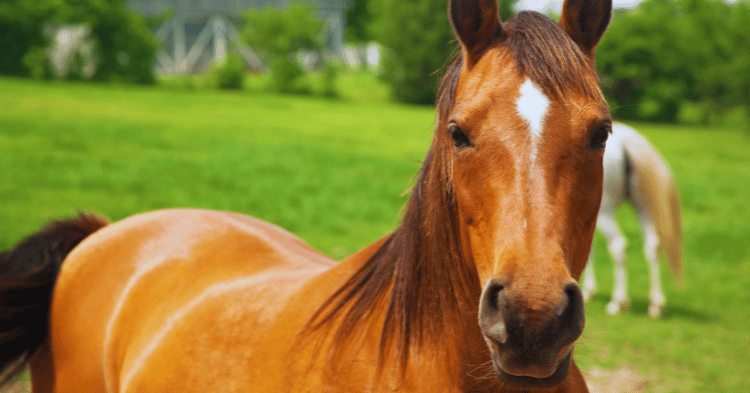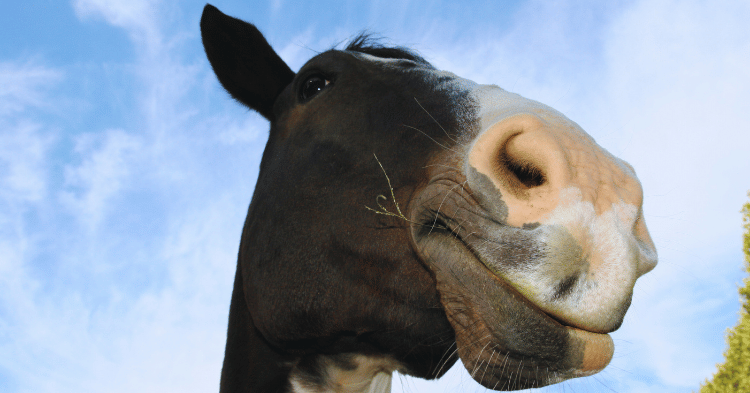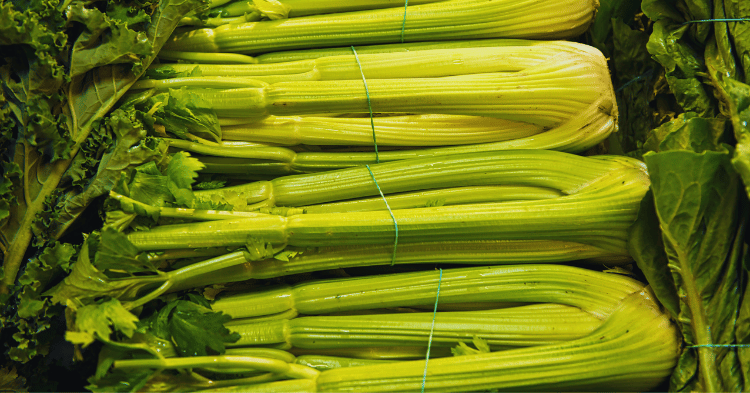Your horse’s diet is a cornerstone of their health and vitality, but introducing new treats can feel like walking a tightrope. You want to surprise your equine companion with something fresh and exciting, yet safe. It’s a common question among horse owners: Can Horses Eat Celery?
This seemingly simple vegetable sparks curiosity—and concern. Celery’s crisp texture and high water content might seem ideal, but is it genuinely beneficial or potentially harmful?
Overloading your horse’s diet with the wrong treats can lead to digestive disturbances or even colic, turning a thoughtful gesture into an unintentional risk. That worry can linger in the back of your mind, making you hesitate at every feeding choice.
Don’t let uncertainty hold you back. In this guide, you’ll uncover everything you need to know about feeding celery to horses, including the nutritional benefits, potential risks, and the best way to incorporate this crunchy delight into their meals. Let’s crunch into the facts!
Celery as a Treat for Horses

Exploring whether horses can safely enjoy celery, we’ll look at the benefits of offering this crunchy vegetable and the importance of moderation in their diet.
Benefits of Feeding Celery
Horses can safely consume celery, and this vegetable carries numerous benefits. Celery is high in fiber, low in sugar, and contains a high water content, making it a suitable option for equine consumption (Chewy). It’s also chewy, encouraging natural wear of their teeth.
Benefits of Celery for Horses:
- Fiber: Essential for digestive health.
- Hydration: High water content helps replenish fluid levels.
- Nutrients: Provides essential vitamins and minerals such as vitamin K, folate, potassium, and phosphorus, which aid in overall health.
| Nutrient | Amount per 80g of Celery | Benefits |
|---|---|---|
| Fiber | 1.6g | Digestive health |
| Vitamin A | 453 IU | Healthy skin and eyesight |
| Potassium | 260mg | Muscle and nerve functions |
| Phosphorus | 16mg | Teeth and bone strength |
Celery’s composition ensures that horses get vital nutrients while enjoying a tasty treat.
Importance of Moderation
As with any treat, moderation is key when feeding celery to horses. Excessive consumption of any food can lead to imbalances in their diet or digestive issues. Celery should be chopped into manageable pieces to avoid choking risks, especially for smaller horses.
Key Guidelines for Moderation:
- Portion Size: Feed small amounts, such as a few sticks at a time.
- Frequency: Offer celery occasionally as a treat rather than a staple.
- Variety: Mix celery with other safe fruits and vegetables to balance their diet.
For further guidance, horse owners should consider consulting a veterinary nutritionist to understand the appropriate diet and treats for their horses. This helps ensure a balanced and healthy nutritional intake for the equine companions.
Understanding the benefits and moderation of feeding celery ensures that horse owners can safely incorporate this crunchy vegetable into their horse’s diet. For more insights, check out our articles on can horses eat bananas and can horses eat apples.
Safety Guidelines for Feeding Celery

Feeding celery to horses can be a healthy treat if done correctly. However, there are specific safety guidelines to keep in mind to ensure that the horse benefits from this crunchy snack without any health risks.
Choking Risks and Precautions
Celery, with its fibrous texture, poses a potential choking hazard for horses, especially smaller ones. Here are some important precautions to follow:
- Cut into Manageable Pieces: Always cut celery into small, manageable pieces to minimize the risk of choking.
- Supervise Feeding: Monitor the horse while it is eating celery to quickly intervene if any signs of choking are observed.
- Introduce Gradually: Give celery in small amounts initially to see how well the horse handles the new treat.
Implementing these precautions can help ensure that celery is a safe part of your horse’s diet. To find out more about safe fruits and vegetables for horses, check our guide on can horses eat grapes.
Introduction into Horse’s Diet
Introducing celery into a horse’s diet should be approached carefully. Here’s a step-by-step guide:
- Start with Small Quantities: Begin by offering a few small pieces of celery. Observe the horse for any adverse reactions.
- Monitor Digestive Response: Watch for any signs of digestive upset. Celery is high in water and fiber, which can aid digestion, but a sudden increase might cause discomfort (Bailey’s CBD).
- Moderate Frequency: Feed celery as a treat rather than a staple. Offer it a couple of times a week, considering the horse’s size, age, and overall health.
| Consideration | Initial Steps |
|---|---|
| Quantity | Start with a few small pieces |
| Observation | Watch for digestive issues |
| Frequency | A couple of times a week |
Following these steps can help ensure that celery is introduced safely and effectively into your horse’s diet. For other nutritious treat ideas, explore our article on can horses eat bananas.
For personalized dietary recommendations, consulting with a veterinary nutritionist is always a good practice. They can provide tailored advice to fit your horse’s specific needs. Understand more on the topic by reading our discussion on safe fruits and vegetables for horses.
Nutritional Value of Celery for Horses

Celery, a crunchy vegetable often found in human diets, provides numerous nutritional benefits for horses as well. When fed in moderation, it can be a healthy treat for your equine friend.
Vitamins and Minerals in Celery
Celery is rich in essential vitamins and minerals beneficial for horses. According to Hashtag Horse, it includes vitamins A, B, C, and K, along with minerals such as phosphorus and magnesium. These nutrients support various bodily functions in horses, from maintaining healthy skin and eyesight to enhancing bone strength and muscle function.
| Nutrient | Quantity per 80g of Raw Celery |
|---|---|
| Vitamin A | 450 IU |
| Vitamin B | 0.1 mg |
| Vitamin C | 3.1 mg |
| Vitamin K | 29.6 µg |
| Phosphorus | 14 mg |
| Magnesium | 10 mg |
Data courtesy Strathorn Farm
Hydration and Digestive Benefits
Celery is a low-calorie vegetable that is 95% water, making it an excellent source of hydration for horses (Bailey’s CBD). This high water content aids in replenishing fluid levels, helping to prevent dehydration. Additionally, celery is packed with fiber, which supports digestive health by promoting regularity and preventing colic.
For a complete list of safe fruits and vegetables that can also enhance hydration and digestion in horses, visit our guide on fruits and vegetables suitable for horse consumption.
Celery can make for a beneficial treat due to its rich nutrient composition and hydration properties. However, always consult with a veterinary nutritionist to ensure it fits appropriately within your horse’s diet (American Stalls). For more information on proper feeding practices, explore our tips on safe horse nutrition.
Additional Dietary Considerations
When considering additional items beyond celery for your horse’s diet, it’s crucial to know which fruits and vegetables are safe and to consult with a veterinary nutritionist for tailored advice.
Safe Fruits and Vegetables
Horses have a variety of options when it comes to safe and nutritious fruits and vegetables. These can be great as occasional treats or supplements to their regular feed. It is essential to introduce them gradually to prevent any digestive upset.
| Fruit/Vegetable | Nutritional Benefits |
|---|---|
| Carrots | High in beta-carotene and fiber |
| Apples | Rich in vitamins and antioxidants |
| Bananas | Good source of potassium and vitamins |
| Spinach | Packed with vitamins A, C, and K, plus iron |
| Kale | Rich in vitamins and minerals |
According to the [Bay Area Equestrian Network], horses can also safely consume celery leaves, which are rich in vitamins and fiber. For a comprehensive list of horse-safe foods, refer to our articles on can horses eat bananas, can horses eat apples, and can horses eat grapes.
Consultation with Veterinary Nutritionist
To ensure that your horse’s diet is balanced and meets all of its nutritional needs, consultation with a veterinary nutritionist is highly recommended. They can provide personalized advice based on your horse’s specific requirements, such as age, weight, activity level, and any health conditions.
Key benefits of consulting a veterinary nutritionist:
- Formulating a balanced diet plan.
- Addressing dietary concerns.
- Recommending quality forage sources.
- Suggesting suitable supplements.
This expert guidance helps in ensuring that your horse receives optimal nutrition. For more tips on feeding and nutrition, you can explore our article on do horses eat hay.

